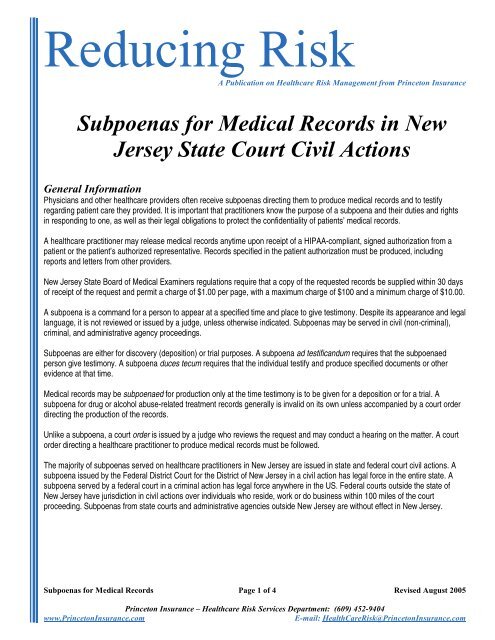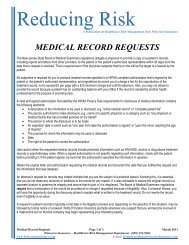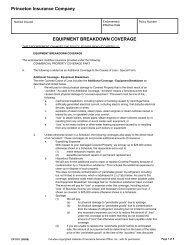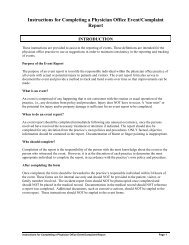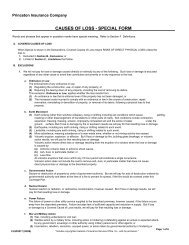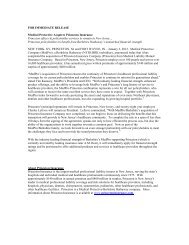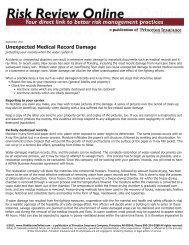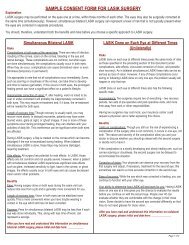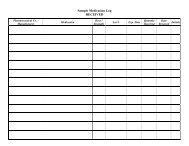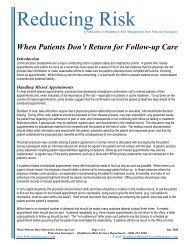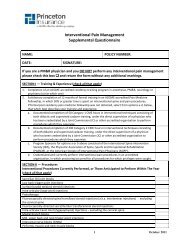Subpoenas for Medical Records in New Jersey State Court Civil ...
Subpoenas for Medical Records in New Jersey State Court Civil ...
Subpoenas for Medical Records in New Jersey State Court Civil ...
You also want an ePaper? Increase the reach of your titles
YUMPU automatically turns print PDFs into web optimized ePapers that Google loves.
Reduc<strong>in</strong>g Risk<br />
A Publication on Healthcare Risk Management from Pr<strong>in</strong>ceton Insurance<br />
<strong>Subpoenas</strong> <strong>for</strong> <strong>Medical</strong> <strong>Records</strong> <strong>in</strong> <strong>New</strong><br />
<strong>Jersey</strong> <strong>State</strong> <strong>Court</strong> <strong>Civil</strong> Actions<br />
General In<strong>for</strong>mation<br />
Physicians and other healthcare providers often receive subpoenas direct<strong>in</strong>g them to produce medical records and to testify<br />
regard<strong>in</strong>g patient care they provided. It is important that practitioners know the purpose of a subpoena and their duties and rights<br />
<strong>in</strong> respond<strong>in</strong>g to one, as well as their legal obligations to protect the confidentiality of patients’ medical records.<br />
A healthcare practitioner may release medical records anytime upon receipt of a HIPAA-compliant, signed authorization from a<br />
patient or the patient’s authorized representative. <strong>Records</strong> specified <strong>in</strong> the patient authorization must be produced, <strong>in</strong>clud<strong>in</strong>g<br />
reports and letters from other providers.<br />
<strong>New</strong> <strong>Jersey</strong> <strong>State</strong> Board of <strong>Medical</strong> Exam<strong>in</strong>ers regulations require that a copy of the requested records be supplied with<strong>in</strong> 30 days<br />
of receipt of the request and permit a charge of $1.00 per page, with a maximum charge of $100 and a m<strong>in</strong>imum charge of $10.00.<br />
A subpoena is a command <strong>for</strong> a person to appear at a specified time and place to give testimony. Despite its appearance and legal<br />
language, it is not reviewed or issued by a judge, unless otherwise <strong>in</strong>dicated. <strong>Subpoenas</strong> may be served <strong>in</strong> civil (non-crim<strong>in</strong>al),<br />
crim<strong>in</strong>al, and adm<strong>in</strong>istrative agency proceed<strong>in</strong>gs.<br />
<strong>Subpoenas</strong> are either <strong>for</strong> discovery (deposition) or trial purposes. A subpoena ad testificandum requires that the subpoenaed<br />
person give testimony. A subpoena duces tecum requires that the <strong>in</strong>dividual testify and produce specified documents or other<br />
evidence at that time.<br />
<strong>Medical</strong> records may be subpoenaed <strong>for</strong> production only at the time testimony is to be given <strong>for</strong> a deposition or <strong>for</strong> a trial. A<br />
subpoena <strong>for</strong> drug or alcohol abuse-related treatment records generally is <strong>in</strong>valid on its own unless accompanied by a court order<br />
direct<strong>in</strong>g the production of the records.<br />
Unlike a subpoena, a court order is issued by a judge who reviews the request and may conduct a hear<strong>in</strong>g on the matter. A court<br />
order direct<strong>in</strong>g a healthcare practitioner to produce medical records must be followed.<br />
The majority of subpoenas served on healthcare practitioners <strong>in</strong> <strong>New</strong> <strong>Jersey</strong> are issued <strong>in</strong> state and federal court civil actions. A<br />
subpoena issued by the Federal District <strong>Court</strong> <strong>for</strong> the District of <strong>New</strong> <strong>Jersey</strong> <strong>in</strong> a civil action has legal <strong>for</strong>ce <strong>in</strong> the entire state. A<br />
subpoena served by a federal court <strong>in</strong> a crim<strong>in</strong>al action has legal <strong>for</strong>ce anywhere <strong>in</strong> the US. Federal courts outside the state of<br />
<strong>New</strong> <strong>Jersey</strong> have jurisdiction <strong>in</strong> civil actions over <strong>in</strong>dividuals who reside, work or do bus<strong>in</strong>ess with<strong>in</strong> 100 miles of the court<br />
proceed<strong>in</strong>g. <strong>Subpoenas</strong> from state courts and adm<strong>in</strong>istrative agencies outside <strong>New</strong> <strong>Jersey</strong> are without effect <strong>in</strong> <strong>New</strong> <strong>Jersey</strong>.<br />
<strong>Subpoenas</strong> <strong>for</strong> <strong>Medical</strong> <strong>Records</strong> Page 1 of 4 Revised August 2005<br />
Pr<strong>in</strong>ceton Insurance – Healthcare Risk Services Department: (609) 452-9404<br />
www.Pr<strong>in</strong>cetonInsurance.com<br />
E-mail: HealthCareRisk@Pr<strong>in</strong>cetonInsurance.com
Lessons from the Crescenzo v. Crane Case<br />
Reduc<strong>in</strong>g Risk<br />
Despite the official appearance and legal language of a subpoena, a prudent healthcare practitioner will not assume that a<br />
subpoena is valid and must be honored without question. Releas<strong>in</strong>g a patient’s medical records <strong>in</strong> response to a subpoena that is<br />
not accompanied by a signed authorization from the patient may place a practitioner <strong>in</strong> legal and professional jeopardy.<br />
The risks of do<strong>in</strong>g so are dramatically presented <strong>in</strong> the case of Crescenzo v. Crane, 350 N.J. Super. 531 (App. Div. 2002), cert.<br />
den. 174 N.J. 364 (2002) <strong>in</strong> which the appellate court ruled that physicians can be legally liable <strong>for</strong> disclos<strong>in</strong>g medical records <strong>in</strong><br />
response to an improper subpoena without the patient’s consent or knowledge.<br />
In Crescenzo, the attorney <strong>for</strong> a husband <strong>in</strong> a divorce action served the wife’s family practice physician with a subpoena duces<br />
tecum <strong>for</strong> the wife’s medical records which conta<strong>in</strong>ed notes regard<strong>in</strong>g treatment <strong>for</strong> depression. The subpoena did not satisfy the<br />
legal requirements <strong>for</strong> a valid subpoena, and it was not accompanied by a signed authorization from the wife permitt<strong>in</strong>g the release<br />
of her medical records.<br />
No notice of a scheduled deposition was <strong>in</strong>cluded with the subpoena. A cover letter sent by the attorney with the subpoena stated<br />
that if the doctor <strong>for</strong>warded the medical records, there would be no need <strong>for</strong> his testimony. The attorney did not obta<strong>in</strong> an<br />
authorization from the wife <strong>for</strong> the release of her medical records, nor did he send a copy of the subpoena cover letter to either his<br />
oppos<strong>in</strong>g counsel or the wife.<br />
The physician <strong>for</strong>warded the records to the husband’s attorney who later <strong>in</strong>troduced them at a custody hear<strong>in</strong>g as evidence on the<br />
issue of the wife’s fitness as a parent.<br />
The wife sued her physician <strong>for</strong> claims aris<strong>in</strong>g from the disclosure of her medical records <strong>in</strong>clud<strong>in</strong>g medical malpractice; breach of<br />
confidentiality; and violation of the physician-patient privilege. She later moved to amend her compla<strong>in</strong>t to add a claim aga<strong>in</strong>st her<br />
husband’s attorney. The trial court dismissed the pla<strong>in</strong>tiff’s action. The Appellate Division court reversed the decision of the trial<br />
court and permitted the pla<strong>in</strong>tiff to pursue her claims aga<strong>in</strong>st both her physician and the attorney.<br />
The appellate court specifically rejected the physician’s argument that failure to comply with the subpoena would have placed him<br />
<strong>in</strong> legal jeopardy and he could have been held <strong>in</strong> contempt of court.<br />
The appellate court noted several options available to a physician to resolve a conflict between preserv<strong>in</strong>g the confidentiality of a<br />
patient’s medical records and comply<strong>in</strong>g with a subpoena <strong>for</strong> the records:<br />
• Obta<strong>in</strong> a signed authorization from the patient<br />
• Contact the patient or the attorney who served the subpoena<br />
• Seek legal advice from personal counsel be<strong>for</strong>e respond<strong>in</strong>g to the subpoena<br />
Pursu<strong>in</strong>g any of the above options would have revealed the legal deficiencies with the subpoena and averted the legal claims<br />
aga<strong>in</strong>st the physician <strong>for</strong> the disclosure of his patient’s medical records.<br />
A Valid Subpoena<br />
A valid subpoena <strong>in</strong> a civil action <strong>in</strong> the Superior <strong>Court</strong> of <strong>New</strong> <strong>Jersey</strong> (state court) must meet the follow<strong>in</strong>g requirements:<br />
• Be served <strong>in</strong> person by an <strong>in</strong>dividual at least 18-years-old<br />
• Name on its face the court and the title of the action, <strong>in</strong>clud<strong>in</strong>g names of the parties and the court docket number and type<br />
of action (civil, crim<strong>in</strong>al or adm<strong>in</strong>istrative)<br />
• Be signed by either the clerk of the court or by an attorney <strong>for</strong> one of the parties, or by a party <strong>in</strong> the name of the court<br />
clerk, and list the address and telephone number of the attorney or party who issued the subpoena<br />
• Direct properly when and where the witness is to appear:<br />
• Trial—anywhere with<strong>in</strong> <strong>New</strong> <strong>Jersey</strong><br />
• Deposition—the county <strong>in</strong> which the witness lives, works or does bus<strong>in</strong>ess <strong>in</strong> person and “only at a reasonably<br />
convenient time”<br />
• <strong>State</strong> Agency—anywhere with<strong>in</strong> <strong>New</strong> <strong>Jersey</strong> consistent with the agency’s powers<br />
• Be accompanied by payment of a witness fee and mileage<br />
<strong>Subpoenas</strong> <strong>for</strong> <strong>Medical</strong> <strong>Records</strong> Page 2 of 4 Revised August 2005
Reduc<strong>in</strong>g Risk<br />
A Valid Subpoena Duces Tecum<br />
In addition to the general requirements <strong>for</strong> a valid subpoena, the <strong>New</strong> <strong>Jersey</strong> Rules of <strong>Court</strong> specify the requirements <strong>for</strong> a valid<br />
discovery subpoena <strong>in</strong> a civil action <strong>in</strong> the <strong>New</strong> <strong>Jersey</strong> state courts. Rule 4:14-7(c) which perta<strong>in</strong>s to a subpoena duces tecum<br />
requires:<br />
• The subpoena must compel attendance at a deposition simultaneously with the production of the subpoenaed evidence at<br />
a designated time and place<br />
• The subpoena must state that the subpoenaed evidence shall not be produced or released until the date specified <strong>for</strong> the<br />
deposition<br />
• The subpoena must state that if the subpoenaed witness is notified that a motion to quash the subpoena has been filed,<br />
the subpoenaed evidence shall not be produced or released until ordered by the court, or all parties to the action consent<br />
to the release<br />
• The subpoena must be served simultaneously at least 10 days prior to the date of the scheduled deposition on the<br />
witness and all parties to the action who shall have the right to <strong>in</strong>spect and copy the subpoenaed evidence<br />
• If evidence is produced by a subpoenaed witness who does not attend the deposition, the party who receives the<br />
evidence must notify all the other parties of the nature and contents of the evidence, and make it available <strong>for</strong> <strong>in</strong>spection<br />
and copy<strong>in</strong>g.<br />
A witness subpoenaed to give deposition testimony may also be entitled to additional fees <strong>in</strong>clud<strong>in</strong>g reimbursement <strong>for</strong> out-ofpocket<br />
expenses and lost earn<strong>in</strong>gs.<br />
A Note of Caution: Some attorneys disregard the court rules and attempt to improperly use a subpoena duces tecum to obta<strong>in</strong><br />
medical records without pay<strong>in</strong>g <strong>for</strong> them. A “discovery” or “records subpoena” improperly directs a physician to produce a copy of a<br />
patient’s records and send them to the attorney’s office <strong>in</strong> lieu of attendance at a deposition. This practice is not sanctioned by the<br />
courts. If served with such a subpoena, contact the attorney who served the subpoena. Request that the attorney either provide a<br />
signed authorization from the patient and payment of the fee allowed by the Board of <strong>Medical</strong> Exam<strong>in</strong>ers regulations, or that the<br />
records be produced at a deposition or trial.<br />
The HIPAA Privacy Rule and <strong>Subpoenas</strong> <strong>for</strong> <strong>Medical</strong> <strong>Records</strong><br />
Disclosure of protected health <strong>in</strong><strong>for</strong>mation (PHI) consistent with the scope of a signed authorization by the patient or the patient’s<br />
authorized representative is permitted by the HIPAA Privacy Rule. The Privacy Rule also permits a healthcare provider to disclose<br />
PHI <strong>in</strong> response to a court order. In<strong>for</strong>mation disclosed <strong>in</strong> response to an authorization or a court order must be limited to that<br />
expressly specified <strong>in</strong> the authorization or the order.<br />
If served with a subpoena <strong>for</strong> PHI that is not accompanied by a court order or signed authorization, the Privacy Rule requires that a<br />
practitioner receive “satisfactory assurances” from the party seek<strong>in</strong>g the PHI that reasonable ef<strong>for</strong>ts have been made to either<br />
ensure that the patient whose records are be<strong>in</strong>g requested has been given notice of the request, or to secure a qualified protective<br />
order as def<strong>in</strong>ed by HIPAA. These assurances are required to be <strong>in</strong> writ<strong>in</strong>g with accompany<strong>in</strong>g documentation.<br />
HIPAA def<strong>in</strong>es “satisfactory assurances” as follows:<br />
• The party request<strong>in</strong>g the PHI has made a good faith attempt to provide written notice to the <strong>in</strong>dividual whose PHI is be<strong>in</strong>g<br />
sought<br />
• The notice <strong>in</strong>cludes sufficient <strong>in</strong><strong>for</strong>mation about the litigation or proceed<strong>in</strong>g to which the requested PHI perta<strong>in</strong>s to permit<br />
the person to raise an objection with the court or adm<strong>in</strong>istrative tribunal<br />
• The time <strong>for</strong> the person to raise objections <strong>in</strong> court or with the adm<strong>in</strong>istrative tribunal has passed and no objections were<br />
filed, or all objections filed by the <strong>in</strong>dividual have been resolved and the disclosures be<strong>in</strong>g sought comport with the<br />
resolution.<br />
A “qualified protective order” is def<strong>in</strong>ed by HIPAA as an order of a court or adm<strong>in</strong>istrative tribunal, or a stipulation by the parties <strong>in</strong><br />
the litigation, that prohibits the parties from us<strong>in</strong>g or disclos<strong>in</strong>g the PHI <strong>for</strong> any purpose other than the legal proceed<strong>in</strong>g <strong>for</strong> which<br />
the <strong>in</strong><strong>for</strong>mation was requested, and mandates the return or destruction of the PHI at the end of the litigation or proceed<strong>in</strong>g.<br />
<strong>Subpoenas</strong> <strong>for</strong> <strong>Medical</strong> <strong>Records</strong> Page 3 of 4 Revised August 2005
Reduc<strong>in</strong>g Risk<br />
The Privacy Rule also permits a practitioner to disclose PHI <strong>in</strong> response to a subpoena without receiv<strong>in</strong>g satisfactory assurances if<br />
he or she makes “reasonable ef<strong>for</strong>ts” to provide notice to the <strong>in</strong>dividual. However, as demonstrated by the rul<strong>in</strong>g <strong>in</strong> the Crescenzo<br />
case discussed above, the <strong>New</strong> <strong>Jersey</strong> state courts are mov<strong>in</strong>g <strong>in</strong> the direction of requir<strong>in</strong>g that a signed patient authorization to<br />
release medical records accompany a valid subpoena <strong>for</strong> the records.<br />
It is strongly recommended that healthcare practitioners adopt a policy requir<strong>in</strong>g a HIPAA compliant, signed<br />
authorization from the patient as a condition <strong>for</strong> releas<strong>in</strong>g medical records requested by a subpoena. In the absence of an<br />
authorization, contact the patient or the attorney who issued the subpoena to discuss the situation and request a signed<br />
authorization.<br />
A Few Words about Trial <strong>Subpoenas</strong><br />
Trial subpoenas are not covered by the requirements that apply to discovery subpoenas. The <strong>Court</strong> Rules permit ex parte service<br />
of a trial subpoena, mean<strong>in</strong>g that notice to the other parties to the lawsuit is not required. A fact witness subpoenaed to testify at<br />
trial is paid an appearance fee and mileage, but is not entitled to reimbursement <strong>for</strong> lost wages. A healthcare practitioner who is<br />
served with a trial subpoena should contact the attorney who issued the subpoena to attempt to work out a mutually agreed upon<br />
appearance time.<br />
If subpoenaed only to produce medical records at trial, you may be able to substitute <strong>in</strong> your place the records custodian <strong>for</strong> your<br />
office. Sometimes the parties to a lawsuit may consent to receipt of a certified copy of the orig<strong>in</strong>al records without a court<br />
appearance by either the practitioner or the records custodian. Contact the attorney who served the subpoena to discuss these<br />
options. If the attorney who served the subpoena makes unreasonable demands on you, contact the court or personal counsel.<br />
Conclusion<br />
Healthcare practitioners served with a subpoena command<strong>in</strong>g them to produce medical records of their patients should not<br />
assume that the subpoena is valid and must be obeyed without any further thought or action on their part.<br />
Where a proper signed authorization from a patient whose records are subpoenaed accompanies the subpoena, the healthcare<br />
provider may produce the requested medical records, consistent with the scope of the authorization, without fear of violat<strong>in</strong>g the<br />
law, medical ethics, or professional licens<strong>in</strong>g standards.<br />
Absent a proper signed authorization from the patient, the prudent practitioner will contact the patient or the attorney who served<br />
the subpoena to discuss the situation and request an authorization. If no authorization is provided, or if the subpoena does not<br />
appear valid, the subpoenaed practitioner should contact his or her personal attorney or Pr<strong>in</strong>ceton Insurance Company <strong>for</strong> advice<br />
and guidance be<strong>for</strong>e produc<strong>in</strong>g a patient’s confidential medical records.<br />
For more <strong>in</strong><strong>for</strong>mation about reduc<strong>in</strong>g risk at your practice, please view our risk management newsletter at www.RiskReviewOnl<strong>in</strong>e.com. To<br />
access additional Reduc<strong>in</strong>g Risk documents, visit our website at www.Pr<strong>in</strong>cetonInsurance.com and click on “Risk Management – Publications.”<br />
This material is not to be construed as establish<strong>in</strong>g professional practice standards or provid<strong>in</strong>g legal advice. Compliance<br />
with any of the recommendations conta<strong>in</strong>ed here<strong>in</strong> <strong>in</strong> no way guarantees the fulfillment of your obligations as may be<br />
required by any local, state or federal laws, regulations or other requirements. Readers are advised to consult a qualified<br />
attorney or other professional regard<strong>in</strong>g the <strong>in</strong><strong>for</strong>mation and issues discussed here<strong>in</strong>, and <strong>for</strong> advice perta<strong>in</strong><strong>in</strong>g to a<br />
specific situation.<br />
<strong>Subpoenas</strong> <strong>for</strong> <strong>Medical</strong> <strong>Records</strong> Page 4 of 4 Revised August 2005


